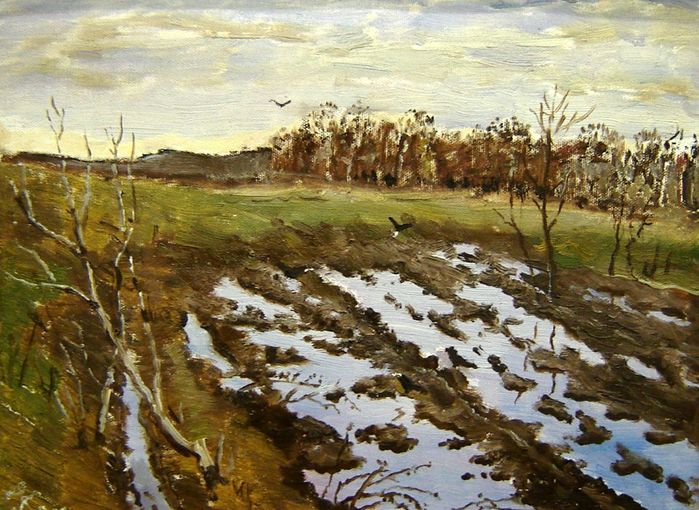Fedor Ivanovich Tyutchev
Still the earth looks sad
And the air is already breathing in spring,
And the dead stalk sways in the field,
And the oil stirs the branches.
Nature has not woken up yet
But through thinning sleep
She heard spring
And she involuntarily smiled ...
Soul, soul, slept and you ...
But what are you suddenly concerned about?
Your dream caresses and kisses
And gilds your dreams?..
Glittering and melting chunks of snow
Shines azure, blood plays ...
Or spring bliss?..
Or is it female love?

For the first time, the poem “The earth still looks sad ...” was published after the death of Tyutchev - in 1876. The exact date of its creation is unknown. Literary critics managed to find out that the work was written no later than April 1836. Accordingly, it refers to the early period of the poet's work.
The main technique on which “Even the earth looks sad…” is based on psychological parallelism, that is, the human soul is compared with nature. The poem can be divided into two parts. First, the poet draws a landscape. The nature of the end of February - the beginning of March appears before readers. Already in the first lines, Tyutchev manages to very accurately describe the early spring. Many researchers of Fedor Ivanovich's work noted his amazing ability to depict a complete picture with just a couple of details. The sad sight of the earth that has not yet woken up after the winter is conveyed by almost a single line: “And the stem sways dead in the field.” This creates a kind of opposition. Despite the fact that nature sleeps, the air is already breathing in spring.
The March awakening after a long winter awaits the human soul. Tyutchev speaks about this in the second part of the poem. Spring is a time of love, rebirth, joy, a time of rejoicing for the soul. Similar thoughts are found not only in the work of Fedor Ivanovich under consideration, but also in some others (“No, my addiction to you ...”, “Spring”). It is worth paying attention to the verbs used by the poet: “kisses”, “caresses”, “gilds”, “excites”, “plays”. All of them are associated with tenderness, love. At the end of the poem, the images of the human soul and nature merge into one, which is typical for Tyutchev's lyrics. The last four lines clearly intersect with "Spring Waters": the same snow, shining in the sun, almost melted, the same feeling of happiness, the fullness of being, the joy of waking up after a long sleep.
Tyutchev is a master of landscape lyrics. The poet managed to achieve amazing accuracy in the descriptions thanks to his endless love for nature. He sincerely considered her animated. According to the philosophical ideas of Fedor Ivanovich, a person should try to comprehend and understand nature, but it is practically impossible to do this. Tyutchev's views were formed mainly under the influence of the German thinker Friedrich Schelling with his perception of nature as a living organism.







